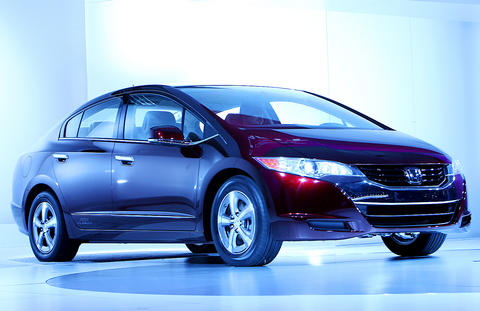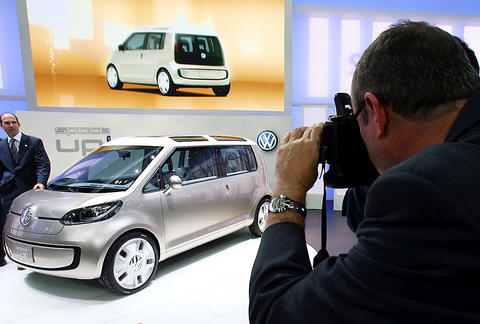When a family sedan that can barely reach 120km per hour gets more attention than the unveiling of a US$1.4 million Lamborghini, you know something major is happening in the auto world.
That was the scene Friday at the Los Angeles Auto show, where thousands flocked to see new hydrogen fuel-cell models from carmakers Honda and General Motors with more enthusiasm than the extraterrestrial Italian supercar the Lamborghini Reventon.
"The Los Angeles show illustrates how automakers, in general, now value miles per gallon as much as miles per hour," said Rick Popely, an auto writer from Chicago.

PHOTO: AFP
Headlining the LA show were announcements from Honda and General Motors as each unveiled plans to market the first hydrogen fuel-cell vehicles early next year. But don't look for them in your local showroom just yet.
Honda said it will begin leasing its new FCX Clarity, powered by a hydrogen fuel cell, to drivers in summer 2008 in southern California.
Honda would not say how many vehicles will be available in the limited lease program. The company plans to offer a three-year lease with a US$600 monthly payment on the sleek, aerodynamic FCX Clarity sedan. Using a fuel cell that combines hydrogen with oxygen to produce electricity from the chemical reaction, the vehicle will have fuel economy of 30km per liter, and the only emissions will be water dripping from the tail pipe.

PHOTO: AFP
US automaker General Motors said it will put 100 fuel-cell vehicles on the road starting next year in California, New York and the city of Washington, including 10 that will transport visitors at Disneyland.
The fuel-cell powered Chevrolet Equinox, a compact sport-utility vehicle (SUV), is the first in a line of hydrogen vehicles that GM says it expects to see in showrooms by 2012, when it plans to start producing 1 million hydrogen vehicles a year.
GM unveiled a hybrid version of its heavy-duty Silverado pickup truck and earned a Green Car of the Year Award for its Chevy Tahoe hybrid, which boasts a two-mode gasoline-electric engine developed with BMW, Mercedes and Chrysler that improves the massive vehicle's fuel economy by 50 percent from conventional models.
Chrysler unveiled its own large hybrids, a Dodge Durango and a Chrysler Aspen. Ford unveiled hybrid plans, as did Porsche, Volkswagen and Audi.
The excitement belied the so-far niche interest of buyers in hybrid vehicles, which currently account for just 2 percent of car sales in the US. But a ruling this week by a federal appellate court in California required the Bush administration to significantly tighten fuel-economy standards.
The court's order overruled previous regulations that failed to thoroughly assess the economic impact of tailpipe emissions that contribute to climate change.
The ruling came in response to an appeal by four environmental groups and 13 states led by California against loopholes in the federal government's fuel-economy requirements for automakers. California is suing the federal government to get permission to enforce its own fuel-economy standards.
California Governor Arnold Schwarzenegger described the ruling as "another win for the environment and for consumers."
"Clearly, automobile companies have the capability to produce environmentally friendly cars," he said. "Today's court ruling underscores the need for the federal government to step in and provide the extra push necessary to make these vehicles widespread."

Growing up in a rural, religious community in western Canada, Kyle McCarthy loved hockey, but once he came out at 19, he quit, convinced being openly gay and an active player was untenable. So the 32-year-old says he is “very surprised” by the runaway success of Heated Rivalry, a Canadian-made series about the romance between two closeted gay players in a sport that has historically made gay men feel unwelcome. Ben Baby, the 43-year-old commissioner of the Toronto Gay Hockey Association (TGHA), calls the success of the show — which has catapulted its young lead actors to stardom -- “shocking,” and says

The People’s Republic of China (PRC) invaded Vietnam in 1979, following a year of increasingly tense relations between the two states. Beijing viewed Vietnam’s close relations with Soviet Russia as a threat. One of the pretexts it used was the alleged mistreatment of the ethnic Chinese in Vietnam. Tension between the ethnic Chinese and governments in Vietnam had been ongoing for decades. The French used to play off the Vietnamese against the Chinese as a divide-and-rule strategy. The Saigon government in 1956 compelled all Vietnam-born Chinese to adopt Vietnamese citizenship. It also banned them from 11 trades they had previously

Inside an ordinary-looking townhouse on a narrow road in central Kaohsiung, Tsai A-li (蔡阿李) raised her three children alone for 15 years. As far as the children knew, their father was away working in the US. They were kept in the dark for as long as possible by their mother, for the truth was perhaps too sad and unjust for their young minds to bear. The family home of White Terror victim Ko Chi-hua (柯旗化) is now open to the public. Admission is free and it is just a short walk from the Kaohsiung train station. Walk two blocks south along Jhongshan

Snoop Dogg arrived at Intuit Dome hours before tipoff, long before most fans filled the arena and even before some players. Dressed in a gray suit and black turtleneck, a diamond-encrusted Peacock pendant resting on his chest and purple Chuck Taylor sneakers with gold laces nodding to his lifelong Los Angeles Lakers allegiance, Snoop didn’t rush. He didn’t posture. He waited for his moment to shine as an NBA analyst alongside Reggie Miller and Terry Gannon for Peacock’s recent Golden State Warriors at Los Angeles Clippers broadcast during the second half. With an AP reporter trailing him through the arena for an